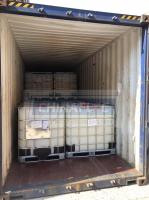Our Products
Product Center / polydadmac(arifloc c601)equivalent model can be replaced by Chinafloc-fl4540

Introduction
PolyDADMAC, or poly(diallyldimethylammonium chloride), is a high-charge, water-soluble cationic polymer. It is produced by polymerizing the quaternary ammonium salt monomer diallyldimethylammonium chloride (DADMAC). The version specified—40% solid content with 8000 cps viscosity—represents a relatively concentrated, medium-to-high molecular weight solution designed for industrial and municipal applications where strong cationic charge density is required. Because of its high positive charge, PolyDADMAC is effective in destabilizing negatively charged colloids, binding suspended matter, and improving water clarification processes.
This compound has found extensive use across industries including water treatment, paper manufacturing, mining, textiles, oil and gas, and personal care. Below is a comprehensive discussion of its applications, emphasizing why the 40% solid, 8000 viscosity grade is suitable for particular operations.
1. Water and Wastewater Treatment
a. Coagulant and Flocculant Aid
One of the most significant applications of PolyDADMAC is in water purification and wastewater treatment. Suspended particles in water often carry negative surface charges, making them resistant to aggregation. PolyDADMAC, with its high cationic charge density, neutralizes these charges, promoting aggregation of fine particles into larger flocs. These flocs can then be removed more easily through sedimentation, flotation, or filtration.
The 40% solid, 8000 cps viscosity version is preferred because:
-
Its concentrated form reduces handling volume.
-
Its viscosity indicates adequate molecular weight for bridging action between colloidal particles.
-
It works effectively across a wide pH range, reducing the need for pH adjustment.
b. Sludge Dewatering
In municipal sewage treatment, PolyDADMAC helps improve sludge dewatering by conditioning sludge before centrifugation or filtration. The polymer binds water molecules and fine solids, leading to drier sludge cakes and reduced disposal costs.
c. Desalination Pretreatment
In seawater reverse osmosis (SWRO) plants, PolyDADMAC is used as a pretreatment coagulant. It prevents fouling of membranes by removing suspended matter, bio-colloids, and organic contaminants, thus extending membrane life and improving operational efficiency.
2. Paper and Pulp Industry
a. Retention and Drainage Aid
In paper manufacturing, fines, fillers, and fibers need to be retained on the paper web while water drains efficiently. PolyDADMAC acts as a retention and drainage aid, binding negatively charged fillers (like kaolin, calcium carbonate, and titanium dioxide) to cellulose fibers. The result is improved paper formation, enhanced strength, and reduced raw material loss.
b. Fixing Agent
PolyDADMAC is widely used as a fixing agent for anionic trash. During pulping and bleaching, negatively charged impurities like lignin sulfonates and hemicellulose residues remain in the slurry. These impurities interfere with wet-end chemistry. PolyDADMAC neutralizes them, improving the efficiency of other additives like sizing agents and dyes.
c. Conductivity Control in Specialty Papers
Because of its high cationic charge, PolyDADMAC can also be used to control conductivity in papers requiring electrostatic properties, such as security papers or specialized packaging materials.
3. Oil and Gas Industry
a. Oil–Water Separation
In petroleum production, especially during enhanced oil recovery and produced water treatment, separating oil droplets from water is challenging due to emulsions stabilized by natural surfactants. PolyDADMAC serves as a demulsifier and flocculant, breaking these emulsions and allowing for cleaner separation of oil and water.
b. Drilling Mud Conditioning
During drilling, water-based muds often contain fine clays that disperse due to their negative surface charge. PolyDADMAC acts as a clay stabilizer, preventing swelling and dispersion, which stabilizes boreholes and improves drilling efficiency.
4. Mining and Mineral Processing
In mineral processing, fine particles suspended in process water or tailings streams are difficult to separate. PolyDADMAC serves as a flocculant aid, promoting faster settling of tailings and improving water recovery. Its high charge density makes it effective in treating ores such as bauxite, phosphate, and coal.
Additionally, in froth flotation circuits, PolyDADMAC can function as a depressant for gangue minerals, improving selectivity and concentrate quality.
5. Textile and Dyeing Industry
PolyDADMAC plays a role as a fixing agent for dyes and pigments. In textile dyeing, many dyes carry negative charges and can bleed or fade if not adequately fixed. PolyDADMAC binds these dyes strongly to fibers, enhancing color fastness.
It is also used in wastewater treatment from dyeing operations, where its cationic nature helps remove excess dyes, reducing effluent coloration and chemical oxygen demand (COD).
6. Cosmetic and Personal Care Applications
Though less common than in industrial sectors, PolyDADMAC is used in hair conditioners, shampoos, and skin-care formulations. Its cationic nature allows it to bind to negatively charged sites on hair and skin, forming a thin film that improves softness, manageability, and antistatic properties. The grade with 40% solid and 8000 cps viscosity is usually diluted before use in cosmetic formulations, as lower concentrations are more appropriate for direct application.
7. Leather and Tanning Industry
PolyDADMAC is applied in leather processing as a dispersant and fixing agent. It helps in fixing anionic dyes and fatliquors onto leather fibers, improving color uniformity and leather strength. Its role as a coagulating agent also aids in wastewater treatment from tanneries, which is often rich in suspended matter and dyes.
8. Electronics and Specialty Applications
Because PolyDADMAC forms clear, conductive films, it finds niche applications in the electronics industry. For example, it can be used in coatings for antistatic films, electroconductive layers, and membrane modification.
In membrane production, PolyDADMAC can be used as a surface modifier to impart hydrophilicity or improve fouling resistance, especially for ultrafiltration and nanofiltration membranes.
Advantages of the 40% Solid, 8000 Viscosity Grade
-
High Concentration: Reduces transport and storage costs compared to more dilute grades.
-
Moderate Viscosity: Indicates suitable molecular weight for a balance between charge density and bridging capacity.
-
Versatility: Effective across diverse industries, from municipal water treatment to high-end specialty uses.
-
Ease of Dilution: Can be readily diluted to the concentration required for specific applications.



394_small.jpg)
467_small.jpg)